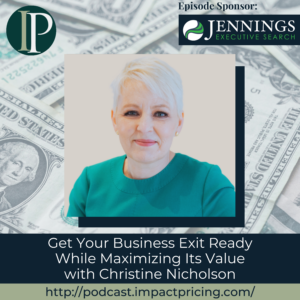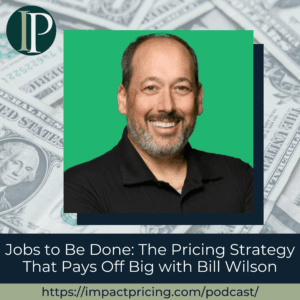Christine Nicholson has a 25-year experience of running companies in multiple sectors. She started, built, and exited multiple successful businesses. She took a business from £0-£4.5m turnover in 15 months. And she also rescued a bankrupt company from millions in debt to an eight-figure exit in under 18 months. More than just experience, she studied hard to become a Chartered Management Accountant with a law degree, a postgraduate degree in Information Systems Management – and a Professionally Accredited and Experienced Business Mentor.
In this episode, Christine shares valuable insights on several key topics related to business valuation and pricing like the owner’s emotional attachment, preparing a business for sale and customer feedback for pricing strategies. She provides a balanced view of how to strategically prepare a business for sale, emphasizing the importance of logical pricing decisions and understanding customer value perceptions.
Podcast: Play in new window | Download
Why you have to check out today’s podcast:
- Gain insights on emotional influence in business decisions to help you make more informed, rational decisions that enhance your company’s value.
- Discover actionable tips on how to boost a company’s valuation by implementing effective pricing strategies.
- Learn the importance of customer engagement to understand their perception of value for better pricing decisions.
“Go and ask your customers what they think of your service. If you were no longer providing this service, what would they be willing to pay for the level of service that they get from someone else?”
– Christine Nicholson
Topics Covered:
01:02 – How did she get involved in pricing
03:20 – Discussing a common misconception among business owners regarding the value of their businesses
03:51 – Highlighting a scenario of the emotional complexities and the challenges business owners face when selling their businesses
12:22 – The psychological dynamics involved when business owners try to value their businesses and their services
14:37 – Explaining the key factors that sophisticated buyers look for when purchasing a company
17:22 – Deeper motivations tied to personal beliefs and values other than price when selling a business
19:40 – How adjusting pricing is one of the quickest and easiest ways to improve a business
22:05 – Christine’s approach to helping companies fix their pricing strategies which involves more than simply raising prices
24:07 – Addressing the emotional and logical aspects of business decision-making
25:36 – Christine’s best pricing advice
Key Takeaways:
“When you’re talking directly to your customers, you have to talk with your heart because you’re dealing with one human being typically to another. ” – Christine Nicholson
“…if you get your pricing right, then you’re going to make more profits; you’re going to generate more positive cash flows.” – Christine Nicholson
“When it comes to selling your business, all the heart is with the seller, and all the logic is with the buyer.” – Christine Nicholson
“When people put their soul into something, they attach a value to it when they’re selling their business; ironically, and completely paradoxically, they don’t attach the value of the effort that they put into the business to their customers.” – Christine Nicholson
“One of the biggest problems that I see from a selling business is where somebody is mentally associating the value of the business by the effort they’ve put in, but they’re not reflecting that correctly in the way that their pricing to their customers.” – Christine Nicholson
“You need to believe the value that you are giving to your client.” – Christine Nicholson
“Buyers do not want to buy a job. They are buying an investment that has a hard return on capital. And the more certain they are about the return on capital, the higher the money that they will pay and the faster you’ll get the cash in your bank.” – Christine Nicholson
Connect with Christine Nicholson:
- LinkedIn: https://www.linkedin.com/in/christine-nicholson/
- Website: https://getexitready.co.uk/
Connect with Mark Stiving:
- LinkedIn: https://www.linkedin.com/in/stiving/
- Email: [email protected]
Full Interview Transcript
(Note: This transcript was created with an AI transcription service. Please forgive any transcription or grammatical errors. We probably sounded better in real life.)
Christine Nicholson
Go and ask your customers what they think of your service. If you were no longer providing this service, what would they be willing to pay for the level of service that they get from someone else?
Intro / Ad
Mark Stiving
Welcome to Impact Pricing, the podcast where we discuss pricing, value, and the saleable relationship between them. I’m Mark Stiving, and our guest today is Christine Nicholson. Here are three things you want to know about Christine before we start. She is the UK Business Mentor of the Year in 2023, and that’s for the fourth time. She helps companies prepare their businesses for exit, and she started and sold Divine Legs Limited in two years. Welcome, Christine.
Christine Nicholson
Thank you. Thanks very much for having me. And pricing is one of those really important factors that just, I don’t think it gets enough airspace.
Mark Stiving
Well, you and I can agree on that. So it’s a great start. So I always ask the question, how did you get into pricing? But I’m sure you wouldn’t say, hey, you’re not in pricing, but how did you get into this business or how did you find this concept of helping companies exit?
Christine Nicholson
So the backstory is actually quite long. But the short version is when I was very small, I watched a favorite relative of mine, my favorite uncle, crushed by the failure of his business. And it was kind of something that sat in the back of my psyche and then rolled forward sort of 20 years. And I qualified as an accountant. And my first job as a qualified accountant, my job description had two lines on it. First one, keep us legal, do your end stuff, and VAT and tax and all that kind of boring stuff, which was so boring that I made it as efficient as possible so that I could get on with line two. And line two, which is actually very pricing appropriate, was find ways of adding value to this business. And their value is translated as two things make us more profitable, make our capital value higher.
And pricing is actually linked to both of those because if you get your pricing right, then you’re going to make more profits; you’re going to generate more positive cash flows. But equally the flip side of that is you are always increasing the capital value, because the worst thing that can happen is you sell your business and a buyer comes along and sees that you’ve got a fundamentally flawed business model. And then they go, I know on paper this looks like it should be worth, I know 10 million, but there’s so much risk in here, and I’m going to have to do so much work that I think it’s probably only worth about 6 million to me. So as a seller, you’re already on the back foot because you haven’t really paid attention to one of the key fundamentals. And going back to the apprenticeship that I did what I call my exit apprenticeship in several of the businesses within that family-owned group of businesses, pricing, and the business model was absolutely key.
Mark Stiving
So I would certainly agree with that. I didn’t know I was going to take the conversation this way, but let’s pretend that I want to sell my business, right? And by the way, I can tell you that my business is not saleable. I get it completely. Because if I’m not working, no one’s going to hire my business.
Christine Nicholson
Again, that’s a really important point because many business owners genuinely think and are proud of the fact that their business really needs them. So therefore, the more it needs me, the more it must be worth because I’m a really valuable employee and that, but they don’t think of themselves as an employee. They think of themselves as a business owner, and then they completely forget that they have to turn up at nine to five and they have to do a job. So yeah, it’s a really valuable point.
Mark Stiving
Yeah. My COO and I often sit around and think about how to make me redundant? How can we make someone else do the same things I do, not trivial given what I do, but I’m sure it’s possible and we’ll figure it out one of these days. But here’s what I wanted to do. First off, I’m going to take a step back and I want to talk about your company called Divine Legs, right? By the way, I don’t really know what the company is, I’m going to read what you put on your LinkedIn page. I got to tell you that I love what you put on your LinkedIn page. And so here’s what you wrote, ‘Divine Legs is the UK’s number one hosiery subscription company delivered through your letterbox with your choice of quality hosiery to suit your needs. Divine legs takes the legwork out of shopping for hosiery and gives you gorgeous legs.’ Right? That’s awesome. Now, here’s what I love about it is you didn’t say we give the biggest variety of hosiery. You didn’t say we have overnight delivery. Right? You’re not talking about your features. You were talking about the value to the buyer, right? So we’re going to give you a large selection. we’re going to take the legwork out of shopping, and we’re going to give you beautiful legs, right? That was amazing. Okay. Now let’s talk about a business. So I want to sell a business and we go to sell a business. We’re not going to go in and say, here’s what you’re buying. Right? So, what are those value statements that we start talking about as we sell a business? Or did I just confuse the heck out of you?
Christine Nicholson
Oh, no, no, no, no. I actually really liked the distinction, because we are talking about the difference between black and white. When you are dealing with your end customer, it doesn’t matter whether it’s B2B or B2C. When you’re talking directly to your customers, you have to talk with heart because you’re dealing with one human being typically to another. There’s usually a selling human being and a buying human being. When you come to selling your business, all the heart is with the seller, and all the logic is with the buyer. So this is a classic. Men are from Mars, women are from Venus situation because the seller is the owner who with the clients, I work with owner-managed business. So owner-managed and owned so the founder is generally working in the business. They’ve put their sweat, stress, and sacrifice into the business, and they’ve given that a value. Now, when you think about when you are talking to a customer, you know as the business owner, that your customer isn’t interested in all that sweat, stress and sacrifice, they care about how they feel when you’ve delivered a product. When you flip it over to selling the business, you are now dealing with effectively a robot. I mean, if you’re lucky, you’ll get, oh, sorry, go on.
Mark Stiving
I have to pause you for just a second. I actually think that when a company is selling a product, it’s really, really similar to what you just described in the sense that it’s my product. I help design it, I help create it. So I’ve got this emotional attachment to it. And to me, I can’t think of what it’s like to logically decide should I buy that product or not, or should I buy that product or a different product? I actually think selling my company is the exact same thing, but probably at a much higher level, at a much bigger level of, oh my God, this is my baby.
Christine Nicholson
Yes. And this is effectively, when you’re selling a business, you have to be prepared to walk into a room with a relative stranger and strip to the core because they are going to look at everything, and they are going to look at it from a different perspective to you. They are going to look at it from a logical perspective. So, with customers, there’s an element of logic on the customer’s buying side, but there’s always heart on both sides. This feeling on both sides, selling a business has only got one side of feeling, and that’s the seller’s side. And unfortunately, that’s not the side that you need it to be on. So the seller is going to stand figuratively, not literally, hopefully naked in front of the buyer. And the buyer is literally going to pick them two pieces in a way that a customer, when you are buying a product, never will, oh, yeah, that you’ll always get disgruntled customers who’ll have a bit of moan. They’ll give you a bit of a bad review. They’ll possibly come back and say, this wasn’t worth what you sold it for, and maybe ask for a refund. The buyers won’t do that. Buyers don’t even part with the money. They just walk away.
Mark Stiving
I think the other thing that happens when you’re selling a business is a buyer of a business has probably bought a lot of businesses in the past. They know what they’re looking for. They know how to look for the flaws or the holes in your business. And if you are the owner manager, you’ve sold zero businesses in your past, this is the very first one. And boy, the level of expertise sits on the buyer side, in that case, not the seller side.
Christine Nicholson
Yeah. that is one thing that I found where there was a real gap in the market, because I’ve been on the buying side, and I’ve been on the selling side. So, and I’ve sold my own businesses, and having vowed never to get emotionally attached, it’s all very well doing all that. Yes. I promise I will never get emotionally attached. Yeah. As soon as you’re outside of the confessional, that’s it. Forget it. You’ve forgotten your promises. Because if you found something, you’ve physically put yourself into it. You’ve had to drive the belief in it. And actually just to link this back to pricing for a second. When people put their soul into something, they attach a value to it when they’re selling their business. Ironically and completely paradoxically, they don’t attach the value of the effort that they put into the business to their customers.
And so, one of the biggest problems that I see from a selling business is where somebody is mentally associating the value of the business by the effort they’ve put in, but they’re not reflecting that correctly in the way that their pricing to their customers, because they’re not really selling on value. They might think that consciously they’re trying to think, I’m not selling my time for professional services, for example. But actually subconsciously, that’s exactly what they’re doing. They’ve attached a value to their time. Sometimes it’s a zero value, and therefore their pricing model doesn’t actually match up. And it’s just ironically in the same brain, they attach a different focus to their value when they’re trying to sell their business.
Mark Stiving
Okay. I want to repeat what you just said, only because I think it was so interesting, and I have no idea what the answer to this is, but what you just said was, business owners probably undervalue the products they sell, or at least their own time as they’re putting it into the products they sell, and they overvalue the overall company that they think they’re going to sell as they could do that. I could see that being absolutely true. And I think that’s fascinating. Usually when I work with a solopreneur or someone who’s trying to sell their own personal time, almost always they lack confidence, right? They lack the ability to say, hey, I want the higher price, right? I deserve a higher price. And I think what it is, is they’re afraid to hear no, because if they hear no, they think it’s about them, and it’s not about the service just wasn’t a good fit or something. It’s kinda like dating, right? So if you ask someone that on a date and they say no, it’s like, oh, I’m a horrible person. Right? Yeah. But I don’t see why it’s different when they’re selling their company. I think that’s fascinating.
Christine Nicholson
I’m sure there’s some fancy psychological word for it. And annoyingly, if you ever watch, in the UK we’ve got something called Dragon’s Den. I think in the UK you call it Shark Tank.
Mark Stiving
In the US. Yeah.
Christine Nicholson
And when you see, yeah, so you see people going on there and they’ve got an idea, and then they’re presenting it, and the dragons or sharks will say, it’s a great idea, but you are completely uninvestable. Or they’ll say, yeah, it’s an okay idea, but you are totally investible. And I think if we invest in you, we can get the idea to where it should be. And what they’re doing is reinforcing the identity of the person who’s usually the founder into the capital value of the business. And then, like I said, completely paradoxically, the minute they start doing business, unless they’ve got sort of a professional mentor or a coach or someone who says you’re way undercharging, they’ll kind of make up their own value in their heads according to whether they’re a buyer or not. Invariably, they’re not their own customers. And I think that’s one of the key issues, women particularly will undersell themselves. Accountants are terrible at undervaluing and under-selling themselves. And fundamentally, I think the problem is articulating value. It’s not only understanding the value to the client, being able to articulate the value to the client. And here’s the thing, the seven inches between your ears, you need to believe the value that you are giving to your client.
Mark Stiving
Yep. Okay. I want to go back to the question I asked you. And it’s a hard question but if I think about hosiery and what you did with your company, you take the legwork out of shopping and you provide gorgeous legs, okay? Now you’re selling a company, not that company, you’re selling a random company. How do you pitch to a buyer of a company? What are some of the things you’re talking about? I mean, it’s not just revenue margin, ARR, things like that. What are you pitching? How do you pitch that to a buyer?
Christine Nicholson
In normal circumstances with a sophisticated buyer, so somebody who’s bought more than one company, generally they’ve bought half a dozen as a minimum. But the sophisticated buyers, they are only interested in the hard path. This company generates positive net cash flow of X every year without fail. So they’re interested in consistency and certainty and absolute clarity on what it is that they’re going to get when they get the keys to the castle. So it’s actually even the same approach in terms of taking the legwork out of shopping, for example. As an investor, you are going to get an ROI that will repay your capital investment within this period of time. It’s really, really clear A to B with the shortest amount of friction. So the last thing you want to do is say, well, if you buy this company, it sells widgets and it’s got these really nice clients. And yeah, sometimes the year is great. And sometimes we have a good year and sometimes we have a bad year. Investors don’t want to, they’re not interested in that. And here’s the big message. Buyers do not want to buy a job. They are buying an investment that has a hard return on capital. And the more certain they are about the return on capital, the higher the money that they will pay and the faster you’ll get the cash in your bank.
Mark Stiving
Okay, and so now you walk into, do your job, and so you’re going to walk into a family-owned manager and whatever their company is, the words you’re saying to them are, we have to turn this organization into a cash flow generating machine, right? It’s got to be consistent, positive cash flow. And that’s really the whole message. That’s the value of what you’re selling.
Christine Nicholson
That’s the message for if you want to sell this business for the most amount of money, and usually with an owner-managed business or a family-operated business, there’s a balance here. Very rarely does somebody say that. I mean, I’ve had it once or twice, but very rarely does somebody say, I just want to sell for the most amount of money. And it’s the transaction value that’s the most important.
Mark Stiving
But before you finish what you’re about to say, I can’t even imagine what I would put besides, I want to sell my company for the most amount of money. So I’m looking forward to this. What else would someone possibly want besides the most amount of money?
Christine Nicholson
Well, sometimes founders have started something that they really believe in. It’s not about selling a product. They’ve made the change from working for the I don’t know what the phrase is. We call it working for the man, working for a big company, working in a corporate environment because they want something different. They’re looking for that nirvana of financial freedom, location freedom and time freedom. Worst thing that you can ever find in an owner-managed business, I have to say. Because of the values around that, it’s not purely about money. Then they typically want to look after their customers because they’ve usually got very personal relationships. They want to look after their employees, even if sometimes those employees are challenging is probably the politest way I can put this. So they’re looking at things holistically, not just about the money.
And that again, that coming back to the whole pricing and business model issue is when they’re doing that from a business sale, they’re generally not doing it in their actual business. They won’t be looking at their employees. They’ll be looking at how we can focus on keeping clients. Even if they’ve got clients who I would classify them as D clients, you put more heart and soul, you put more time into them and they pay you the smallest amount of fee. And if you were looking at it logically and not from an emotional perspective, you’d probably have fired them majors ago, but they were your first clients. So, you’ve got this kind of crazy loyalty to them when you step back and look logically, you just think, actually it’s better for them and it’s better for me and it’s better for my employees. If I like that, I’ll let this one go.
Mark Stiving
Okay. I could see that, not that I would ever do it, but I could see that. Okay, I want to bring this back to pricing for a second. What I personally do most of the time is work with private equity firms right after they’ve bought a company. I go in and help them figure out how to boost the valuation quickly through new pricing strategies that we’re going to implement. And I always think to myself, why didn’t they do this before they sold the company?
Christine Nicholson
Yes. We work on two sides of the same coin because typically what I’m trained to do is get the business owner to recognize that if they had an out of body experience and they stepped outside of themselves, and then they were the buyer of this business and looked into this business, what would they do to improve it? And pricing is the quickest, easiest way to change everything. It changes the way your customer feels about your product. If they value the product and you’ve got a good service, it changes the way your employees feel about the product that they’re giving. I worked as a waitress for a very short period of time. I was terrible, but I was very fortunate to work in a restaurant where every plate of food was a work of art and tasted like you were eating for the first time.
And I mean, every plate of food, and I mean, sometimes I would be drooling before I even got to the table. Excellent food. That made me feel, I’m only five foot two, that made me feel six feet tall when I was, even though I was bad at everything, taking that plate of food to that customer, knowing that they were going to have an amazing experience of feasting with the eyes, feasting with the nose, feasting with their tongue, that made me feel so much better about all the things that I was really bad at. Your employees could feel like that if you were, had your product correctly priced. If you’re placing yourself as a premium service, charging a premium price, and now you’ve got the money because the business model and the margins are better to treat your employees better, which means that they’re going to be even better at service. You can invest in training and your business is worth more. Oh, and you’re generating more cash even though you’re spending more, it’s a no brainer.
Mark Stiving
Yeah, I definitely prefer to work with companies that like high quality and differentiation more than the low price. How do I sell this at the cheapest version of what I can get to? So what do you usually see when you go into a company and you want to fix their pricing? what do you usually do? Is it just, hey, let’s raise prices, or is there more to it than that?
Christine Nicholson
Oh, I go right back to basics. This is stripping it back to the bone because just actually saying the words just raise your prices is kind of scratching the psychological surface of why the pricing was so bad in the first place. So it’s really about going back to the values and asking them how they want their customer to feel. Because the ones who’ve got premium services, and generally they’re giving a premium service for a budget price, but if they’ve got a premium service, they’re not actually recognizing it because they’re actually, they want to give the best service, but they’re now equating it to the budget price because they feel like they’ve got to compete with their competitors. And oh, we all know that if you’re competing on price, it’s just a spiral to the bottom. One of the things I do is I always give my clients a benchmark report.
So I actually go and do benchmarking of all the other people in their industry, particularly in the UK. And I say, so how do you think your competitors are doing? And then the client will actually give me some indication of where they think they’re doing. And then I’ll say, well, actually this is where they are. This is how much they’re paying their employees. This is how much margin they’re making. This is their revenue for the last year. This is their staff turnover. This is whether they’re growing, shrinking or whatever. And most especially in the SME market, most people don’t have access to that information. So now they can start seeing themselves where they fit in the current hierarchy and it starts to change the way that they feel about the service they’re giving. And then when they change the way they feel, they’ll change the way they think and then they’ll change the way they act.
Mark Stiving
Absolutely, I got to say, Christine, you and I think differently in a lot of ways because I don’t ever care how somebody feels. I’m sure you’re much more effective than I am. I just focus on what’s true and how people think.
Christine Nicholson
So, outside of work, I tend to be a very logical person. Like my nature is logic first, scientific answers first. Over the years I’ve discovered that because my clients are who they are and owner-managed businesses with the owner in the business, they are emotionally attached. So whilst I don’t, overall, I don’t care how people feel either, actually, we’re probably reasonably similar, but the client cares. So I’ve got to get the client to shift their thinking. Because if the client wants to sell for the most amount of money or for the best optimal amount of money, they have to shift their thinking in some way. And all I do is say, well, your decision making here is emotional and as a result of that, this is where you’re going to end up. And if you want to sell your business for this much, then you’re going to have to detach from this feeling because logically this is how it works, and you’re emotionally attached to something else.
Mark Stiving
Yep. Excellent. I have a different technique I use, but it’s all logic, which makes me happy, which is, okay. We’re going to have to wrap this up. But I have to ask the final question. What is one piece of pricing advice you’d give our listeners that you think could have a big impact on their business?
Christine Nicholson
I would go and ask your customers what they think of your service and what they would be willing to pay for the service. If you were no longer providing this service, what would they be willing to pay for the level of service that they get from someone else? And you will be amazed that your customer, I mean, I’ve said this to suppliers of mine. It’s like, I really appreciate the price you’ve just given me, but you’re way too cheap. And everybody’s really surprised. They, oh yeah, but all half my customers. Yep. And you’ll double your revenue and you’ll work half as much. So, my personal thing is engaging with your customers, because most customers won’t even notice a 10% increase in your prices, even if you just said, this is what it’s going to be from here on in year on year.
And then you’ll know whether you’re actually in a price sensitive position because being operating in that ‘competing on price’ is only going to result in a downward spiral. So, yes, actually, I know this is a bit of a rambling answer. Because the first thing is to talk to your customers. But the second thing is, ask your customers. What else, what are the services would you be interested in? Because now you’ve got an upsell and you can reposition your services, which means you can reposition your pricing. So the actions that you can do to take are that, but the first one is you’ve got to have a relationship with your customers where you can actually engage them at that level.
Mark Stiving
Very nice answer. I think probably the biggest problem that all companies have is they don’t listen to their market. They don’t understand how their customers think, what their customers think and they focus too much on their own business, right? Their navel gazing.
Christine Nicholson
Yes.
Mark Stiving
Christine, thank you so much for your time today. If anybody wants to contact you, how can they do that?
Christine Nicholson
So I have a free exit ready quiz where you can find out in about three or four minutes how exit ready you actually are. And it’s at getexitready, all one word, dot co dot uk. Otherwise LinkedIn is my second home, almost like my country home. And if you look up Christine Nicholson, and as long as you see the one that says Business Mentor of the Year, then you’re probably hit the one.
Mark Stiving
Nice. And to our listeners, I’ll also mention that I took that quiz before I got on here just because I wanted to see what it was and very interesting questions. So, if you’re thinking about selling your business, you should absolutely go take that quiz. Thank you.
Christine Nicholson
Thank you very much.
Mark Stiving
Oh, you’re welcome. And to our listeners, again, thank you so much for your time. If you enjoyed this, would you please leave us a rating and a review? Chelsea Harper left us a review on Apple Podcasts saying:
‘Wisdom folded into practical pricing education. This podcast has helped guide me in transforming our accounting and tax firm. Over the last year, deep-seated frustration at work led me to discover a whole new path that included better pricing and improved communication around value. I cherish the professional encouragement I receive in this corner of podcasting.’
And I cherish Chelsea. The check is in the mail, and I always say that, by the way, but I never send money. Okay, finally, if you have any questions or comments about the podcast or pricing in general, feel free to email me, [email protected]. Now, go make an impact!
Ad / Outro
















